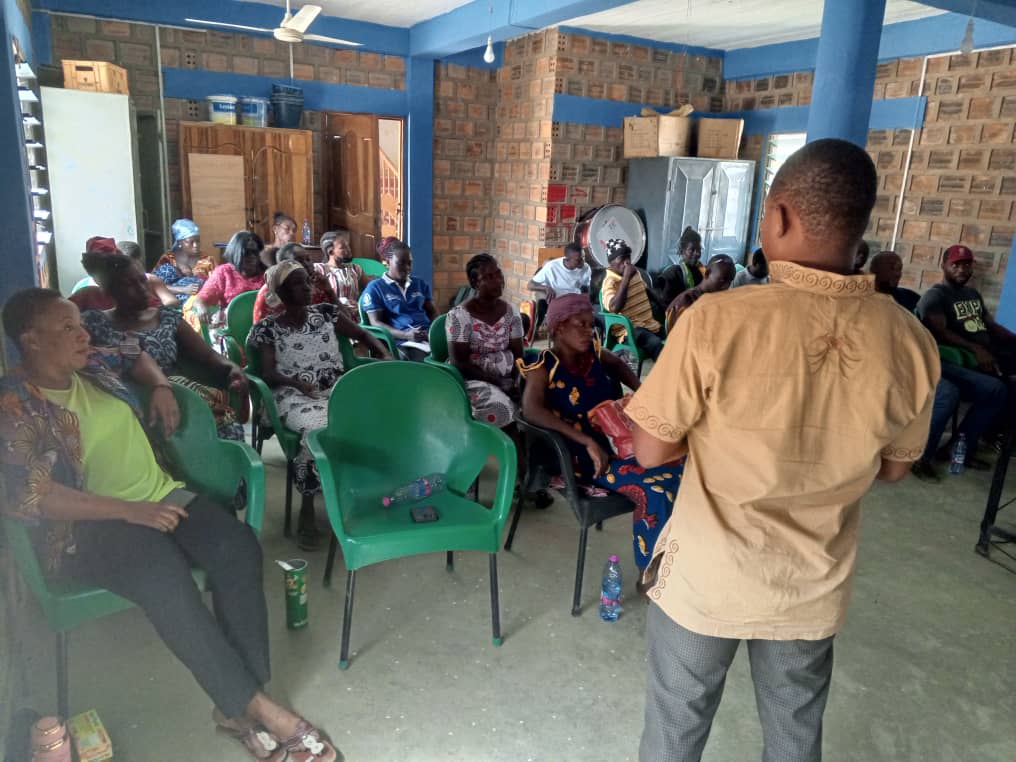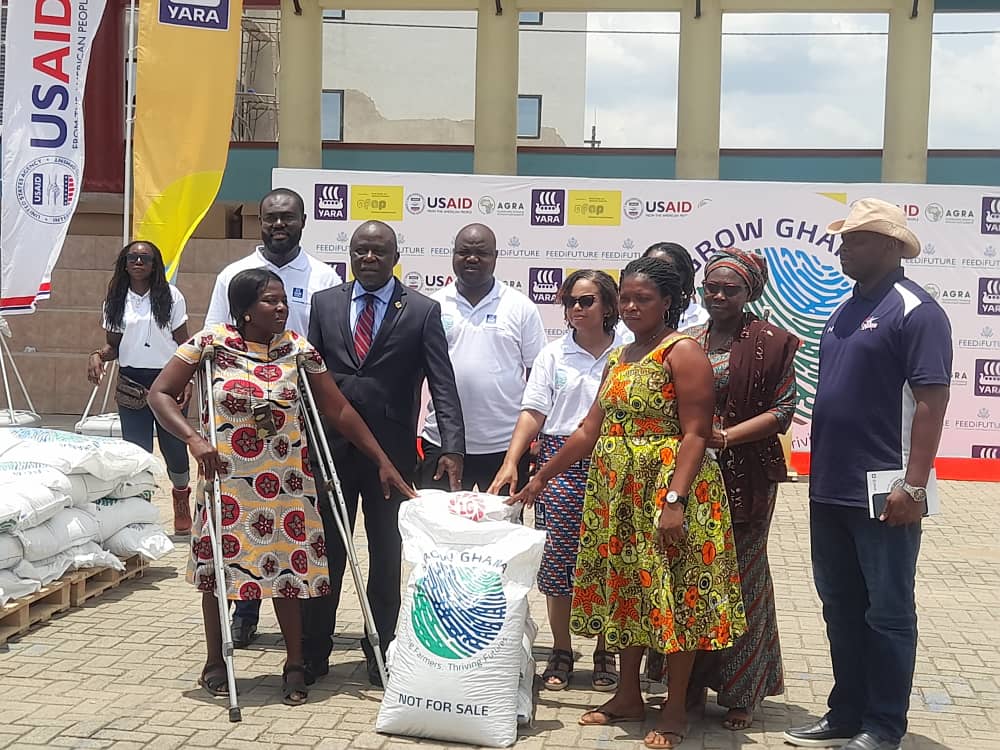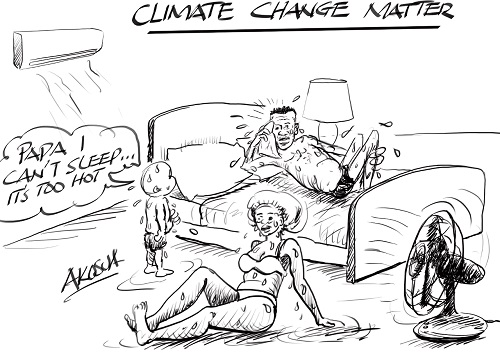
… using indigenous knowledge and techniques to mitigate impact
By David Kyetong GUUN
Climate evolution poses a multifaceted threat to human and environmental well-being, manifesting in devastating flooding, global warming, drought and more. These have far-reaching consequences which include food insecurity, conflicts, public health crises and more. Amid these challenges lies an opportunity for resilience and adaptation. This article proposes how smallholder farmers in Africa can overcome myths and embrace innovative, cost-effective strategies to make their farms’ and livelihoods’ more resilient to increasingly unpredictable rainfall patterns.
The current situation of crops
In August 2023, I visited my hometown Buli in the Upper West Region – and got yam tubers from my dad’s farm. However, when I returned in August 2024 the stark contrast was evident – no yams were ready, and the prospects of fresh yam by September seemed bleak.
According to the stories, this was due to inconsistent rainfall pattern that had taken a devastating toll on the yam farms, a fate shared by numerous other crops across the region. The situation caused hopelessness in families who rely on smallholder farms for their livelihood, jeopardising their human resource development, healthcare and general livelihood due to lost investments.
Climate-Human Interaction
Climate plays a pivotal role in the livelihoods of individuals, particularly in developing countries where climatic factors significantly influence many aspects of life. In Ghana, smallholder farmers are disproportionately reliant on natural rainfall, sunlight and humidity to cultivate crops. Empirical evidence from the Ministry of Food and Agriculture (2017) reveals that 80-90% of smallholder farms depend entirely on rainfall.
This is corroborated by surveys conducted by the Ghana Statistical Service, Food and Agriculture Organisation, African Development Bank and the World Bank between 2018 and 2020. Despite the crucial role of climate in smallholder farming, their reliance on it renders them vulnerable to the extremities of climate change. This vulnerability is well-documented in the literature (International Finance for Agricultural Development, 2019; Food and Agriculture Organisation, n.d.).
Climate change is altering crop and livestock productivity, threatening the livelihoods of millions of smallholder farmers who rely on these resources for income and food security. The limited resources, inadequate access to credit and insurance, and dependence on rain-fed agriculture further exacerbate the vulnerability of smallholder farmers.
Adaptation strategies by smallholder farms
Indigenous knowledge has been instrumental in enabling local farmers to develop adaptive strategies and responses to the adverse impacts of climate variability. Research conducted by M-Buu et al in the year 2023 corroborates this assertion, revealing that smallholder farmers employ adaptation strategies including the establishment of multiple farms, modifications to planting techniques, adoption of improved varieties and crop diversification.
Furthermore, farmers selectively choose crop varieties suited to the specific climatic conditions affecting their land. In addition, an increasing number of smallholder farmers are adopting relatively modern agricultural techniques – including using tractors, applying weedicides, fertiliser and more.

Gaps in the adaptation strategy
Despite the implementation of adaptation strategies, smallholder farmers continue to experience alarmingly low yields annually, perpetuating food insecurity and abject poverty that threaten individual and community development. The reliance on smallholder farm yields for income to fund essential expenses, such as education, healthcare and recreation, exacerbates this issue.
This paper argues that the persistent low yields can be attributed to gaps in adaptation strategies – specifically the ‘watering myth’; the misconception that rainfall is the sole means of crop watering, leading to a lack of planning for alternative watering methods.
Notably, smallholder farmers prioritise investments in tractor services, seedlings and fertiliser with an average cost of GH?1,000 in the 2024 farming season, yet neglect to allocate funds for crop-watering. Similarly, those unable to make financial investments form cooperative groups to assist with land clearing, sowing and weeding, but exclude watering from their collective activities. Consequently, both categories of farmers overlook watering – leaving their crops vulnerable to drought and other adverse climatic conditions.
The way forward
This paper advocates for farmers of all categories to assume responsibility for watering their farms. However, the average smallholder farmer often dismisses this notion with excuses such as “it’s impossible” or “too tedious” Others cite distance from water bodies as a barrier. This paper contends that these excuses are rooted in a deeply ingrained belief that watering their farms is not their responsibility. Years of reliance on rain-fed farming have perpetuated this mind-set, leading to a cultural norm where farmers scoff at the idea of self-watering their crops, even when water sources are nearby and crops are drought-stressed.
To address this, farmers should allocate a portion of their investment to make hand-dug wells or mini irrigation facilities or draw water to their farms through the use of bicycles, motorbikes and other means. Alternatively, they can leverage cooperative farming strategies to facilitate mutual watering assistance – using head-pans and other simple tools for fetching water from streams, mirroring existing collaborations for other farm duties. By adopting these approaches, farmers can control their water needs and mitigate the risks associated with rain-fed farming.

The writer is Head, Business Development and Corporate Affairs
Pentecost University, Accra, Ghana
Email: [email protected]
The post Climate pressures and smallholder farmers’ vulnerabilities appeared first on The Business & Financial Times.
Read Full Story
















Facebook
Twitter
Pinterest
Instagram
Google+
YouTube
LinkedIn
RSS